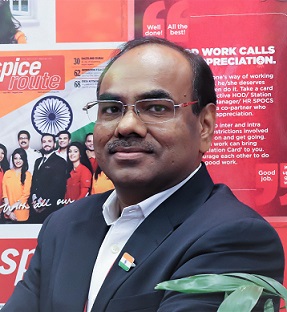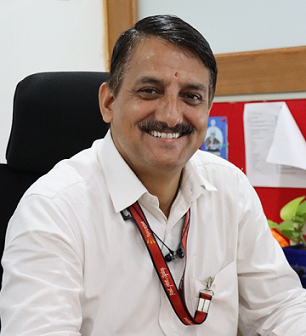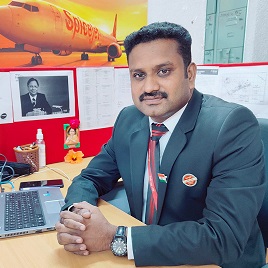



Dear Smiling Teammates,
Wish you Happy 75th Independence Day!
I am sure each one of you has been actively participating in ‘Azadi Ka Amrit Mahotsav’ and ‘Har Ghar Tiranga’ program!
We must pay our tributes to the people who lost their life, family and comfort to ensure that we are borne in independent India and can enjoy everything.
The month of August brings us a lot of celebrations like Friendship Day, Muharram, Raksha Bandhan, Independence Day, Janmashtami, Ganesh Chaturthi etc. Our digital magazine not only covers the festivals but also the Joy and Happiness which is there amongst our team members within the entire network.
In every edition of SpicyReflection, we cover major elements of our life which always help and guide us to achieve our career goal and even help in individual personality development. In July 2022 edition we covered the topic ‘Stress Management, under the series ‘Nurture your talent’. In this August 2022 Edition of our magazine we have taken a step further and will talk about the topic ‘Self-Motivation’.
Everyone love to see something new, and so we bring you to our new column of ‘Hot Shots’ which will showcase short videos which will trigger your funny bones and will make you Smile, So Keep Smiling☺.
We have always made you travel to different parts of our country through “My City My Place” and shared lots of information about our Indian cities, and this time we have covered Bangalore, which is also known as “Silicon Valley of India”. It will be a great experience to know more about this city.
We have also included a travel journal video of our colleagues’ trip to Bangkok.
I would also like to congratulate the winner of SpicyReflection Quiz (May 2022 Edition) Mr. Hari Prakash from Madurai as it will be his 2nd win in this quiz competition. We would like to see more of our colleagues to participate in the quiz and win surprise gifts.
Our focus on customer delight has lead us with many delightful moments with our passengers. In this edition we can see the great effort of our team members which lead to appreciations by our passengers. We congratulate each one of you for your efforts. Keep up the great work!
We would also encourage rest of our employees to participate more actively on our social media page as it helps to highlight our employees and their talent on a larger platform.
Keep showing your love and support and enjoy this edition of our Digital Magazine filled with knowledgeable and interesting facts and share your feedback/ideas for the next edition. Also enjoy our fun filled social media page “SpicyReflection” page on Instagram, Facebook and YouTube. Keep Reading and Sharing !!
Jai Hind!
Your Captain
GP Gupta
Self-motivation or the ability to motivate ourself is one of the most important skill in every human being especially in leadership roles. It helps us to carry on despite adverse circumstances.
Personal motivation can come from various places in life. It could be a promotion at work or admission to the university of your dreams. But understanding what comes naturally to us and what pushes us to perform better lies at the heart of self-motivation.
What Is Self-Motivation?
Self-motivation is the reason why we do what we do. To put it simply, it’s the reason why we go to work, why we love our family, and why we enjoy traveling or reading. It’s about knowing what we really want and pursue it.
The meaning of self-motivated is derived from passion and an underlying desire to achieve something. Personal motivation is a key driving force in our professional journey. Nothing can stand in our way if we’re sure of what we want to do and how we want to do it.
Self-motivation can be developed if we leverage our strengths to our advantage.
Why Is Self-Motivation Important?
Self-motivation is important because it does not let us depend on others and drives us tap our strengths to meet our goals. It also helps us to ensure that we work on our weaknesses and don’t let them hinder our plans.
Here are some key aspects of Self-Motivation and ‘Why weneed to build it’:
1. Achieving Personal Goals
Try to understand the meaning of self-motivated in the context of our personal life. Reasons such as lack of funds, trepidation about visiting a new country or a fear of stepping out of our comfort zone will always hold us back. The first step comes from conviction and determination. We have to believe in our self and convince our self that we can do anything we put our mind to.
2. Doing Well In A Professional Setting
To really do well at work, we need to know our strengths and weaknesses. Self-motivation drives us to move past setbacks and failures to learn from our mistakes. It’s easy to feel bogged down at work, especially when we have a deadline coming up and we’re already running behind schedule.
3. Surviving In a Competitive World
The world may throw problem after problem at us, but if we’re motivated we can overcome any challenge. To hold out against the competition is one of the most useful skills we can develop. Not only does it give us the power to withstand setbacks but also helps us grow as an individual.
We can approach this problem in two ways. We can either continue to feel discouraged or we can buckle up and get moving. Part of personal motivation is to push ourself to face every hurdle that comes along.
What Are Internal And External Motivators?
What we think, do or say is determined by both internal and external factors.
Internal motivators:-
1. Include our thoughts
2. Passion
3. Desire to do something.
External motivators:-
1. Buying a house
2. Performing well at work. etc
Every day we have to strive to strike a balance between internal and external motivators. Internal motivators are back bone of any successful person. When you move up in life, lot of people may not like it or may misguide you in this competitive world, it is your internal motivation which will keep you going. Self-motivation helps us persevere and deal with testing situations on a daily basis.
Ways To Sustain Self-Motivation
We’ve all heard the saying “you are your own worst critic”. Instead of telling ourself why we can’t do something, think of why we can. We can do a lot more than we give our self-credit for. Work hard to refine our existing skills so that we become the best version ofourself. Nurture you talent.
However, it’s important to remember that because we’re feeling motivated today doesn’t guarantee we’ll feel motivated tomorrow. This is a continuous process where we have to act as a personal coach to train our thought process.
Some Self-Motivation practices to achieve our long-term goals:
1. Adopt apositive belief system
Always remain positive. It’s not easy to stay positive in this over jealous world, but that doesn’t mean that we can’t try. Make you own positive world. Stay away from the people who give you negativity and discourage you. Always remain the company of positive people who encourage you and you will good after meeting them and talking to them. Adopting a positive belief system can help us during difficult times. Try to inculcate positive habits and embrace positive thoughts to block negativity. Trust in God.
To apply “the power of positive thinking”, do the following:
• Become aware of our thoughts. Write down these throughout the day.
• Challenge our negative thoughts and replace them with positive ones.
• Create a strong and vivid picture of what it will be like to achieve the goals.
• Develop affirmation or statements that we can repeat to our self throughout the day. These statements remind us of what we want to achieve, and why we should achieve it.
• Practice positive thinking until we automatically think about our self and the world in a positive way, every day.
2. Self-Confidence
• Thinking about the achievements in our life.
• Examining our strengths to understand what we can build on.
• Determine what other people see as our strengths and key capabilities.
• Set achievable goals for our self, work to achieve them, and enjoy that achievement.
• Seek out mentors and other people who model the competencies, skills and attributes our desire.
3. Vision Boards
A great source of personal motivation is a vision board. Creating a vision board and adding pictures of things we wish to buy, our favorite bands or artists we want to meet, our dream travel destination and one thing we want to achieve in the next year. That’ll serve as a constant reminder to get moving on your goals.
4. Focus Our Attention On The Most Important Task
Prioritizing our tasks to motivate ourself. The good way to categorize our to-do list is to mark them as the ‘urgent-important matrix’ to categorize tasks as ‘urgent’, ‘not urgent’, and ‘important’ and ‘not important’. This is a useful tool to prioritize tasks and work on the ones that require immediate attention.
5. Focus and Strong Goals
Our goal should have the following characteristics:
• Clarity - Effective goals are clear, measurable, specific, and based on behavior, not outcomes.
• Challenge - Goals should be difficult enough to be interesting, but not so difficult that we can't reach them.
• Commitment - Goals should be attainable, and should be relevant - that is, they should contribute in a significant way to the major objectives we're trying to achieve.
• Regularity of Feedback - Monitor our progress towards our goals regularly to maintain our sense of momentum and enthusiasm, and enjoy our progress towards those goals.
• Sufficient Respect For Complexity - If the goal involves complex work, make sure that we don't over-commit yourself. Complex work can take an unpredictably long time to complete (particularly if we have to learn how to do the task "on the job").
6. Nature Is Therapeutic
Now more than ever, we understand the importance of connecting with our natural environment. Going to the neighborhood park and enjoying a leisurely walk outdoors as much as possible. Will help to organize our thoughts and think clearly.
7. Music Can Lift Our Soul
It may be a tired cliché but music can really lift our soul. There’ll be multiple situations when we won’t know what to do. In such cases, music can be the escape we need to clear our head and come up with an action plan
Personal motivation is important because it gives us room to think about ourself.
Please remember our ability only decides ‘what we can do’, however our motivation decides what we will actually do’!
Always stay self-motivated!



Heart Speak - Karma & its essence in our lives
August is considered to be the most holy month as we Indians celebrate our Independence Day. This year it becomes more special considering that we are all celebrating the 75th Independence Day as – AzadikaAmritMahautsav wherein we pay tribute to all those who sacrificed their lives for the sake of Independence & pledge to serve our sovereign nation to our best capacity. First of all let me take the opportunity to wish in advance you and every member of your family “A happy Independence day”.
Further being a minuscule part of Airport operation team it automatically comes to my heart to talk about something which is very critical in achieving safe & efficient operations – harmonized efforts/actions by every involved stakeholders. To break it down further to individual level, one’s intent, action or deed usually referred as “Karma” plays a significant part in closing the loop.
“As you sow, so shall you reap” is a well old saying.
India, our spiritual & revered motherland, has been home to spirituality wherein people belonging to different beliefs, faiths & diverse culture, have co-existed from centuries. Many religions which lay emphasis on the need of universal brotherhood and co-existence, have originated from this pious land. For believers in spirituality, the term ‘Karma’ meaning action, work or deed; is the basic principle of simple living wherein an individual’s intent and action influence the future of that individual. In simple terms, good intent and actions contribute to good Karma & bad intent and bad deeds contribute to bad Karma.
In these school of thought, Karma in the present affects one’s future in current life, as well as the nature and quality of future lives. This concept has seen a rapid growth in western culture, in which the events which happen after a person’s actions may be considered natural consequences. A scientific yet simple correlation to law of nature is Newton’s third law: “To every action, there is an equal and opposite reaction”.
Significance of Karma in workplace:
For leaders, along with the demands of daily chores & routines, it is critical to infuse the concept of good Karma into the workplace. The basic roadmap in achieving same can be listed below as:
• Disciplined behaviour (no vice/ego)
• Show gratitude & respect for others
• Praise & acknowledge efforts
• Be honest & transparent
• Listen effectively & communicate concisely
• Be patient
• Be mindful of other’s workloads
• Be sensitive to other’s feelings
• Support colleagues & act collaboratively
Karma: Correlation to Aviation:-
Safety & Efficiency are two primary core elements of aviation. A right mix of two ensures sustainability of the organization & ultimately welfare of employees as is highly capital intensive (huge finances are involved).
Safety: Karma is abstract, we cannot see it but is an energy that transforms from good to bad and to neutral. This energy is derived typically from our actions – what we say and what we do. When it comes to Karma in workplace, even the smallest things matter. From our body language to our tone of voice (both written and verbal), to the way we say, behave & carry ourselves. The way we act can have a huge impact on work relationships & getting job done. Effective communication avoiding any gaps will ensure foolproof procedure implementation as per laid down guidelines, thus, enhancing cycle of ‘Safety’.
Efficiency: With the right team in place, the benefits of creating and maintain positive energy and good Karma can result into higher productivity, job satisfaction and more healthy & cohesive teams contributing to efficiency ( saving time and money by employee retention & better balance sheets).
To conclude, if we practice good Karma in our lives (personal & professional), the results are far reaching which one can experience intrinsically (am sure everyone amongst us might have faced such moments of truth).
By Mr. Deepak Koul (GM-International Operations – Ground Services)

Airbus produces narrow body (single aisle), wide body (twin aisle), cargo and military aircrafts.
The most successful of the narrow body aircraft is the A320 family
It is a series of narrow-body airliners developed and produced by Airbus. The A320 was launched in March 1984, first flew on 22 February 1987.
The first member of the family was followed by the longer A321 (1994), the shorter A319 (1996), and the even shorter A318 (2003).
Final assembly takes place in Toulouse in France; Hamburg in Germany; Tianjin in China since 2009; and in Mobile, Alabama in the United States since April 2016.
Take a look at the A320 introduction (https://youtu.be/Oc9r6ypVxJ8) and 10 Interesting facts about Airbus (https://youtu.be/4EMZ3m8SuEE)
Apart from narrow body aircraft, airbus produces wide body aircrafts like A330 which was in fact produced before the A320 Family
The Airbus A300 is a wide-body airliner developed and manufactured by Airbus. In September 1967, aircraft manufacturers in the United Kingdom, France, and West Germany signed a memorandum of understanding to develop a large airliner. West Germany and France reached an agreement on 29 May 1969 after the British withdrew from the project on 10 April 1969. European collaborative aerospace manufacturer Airbus Industrie was formally created on 18 December 1970 to develop and produce it. The prototype first flew on 28 October 1972.
The first twin-engine widebody airliner, the A300 typically seats 247 passengers in two classes over a range of 5,375 to 7,500 km (2,900 to 4,050 nmi). Initial variants are powered by General Electric CF6-50 or Pratt & Whitney JT9D turbofans and have a three-crew flight deck. The improved A300-600 has a two-crew cockpit and updated CF6-80C2 or PW4000 engines; it made its first flight on 8 July 1983 and entered service later that year.
For more details please watch YouTube Video

In the next session, we will talk about the super iconic air aircrafts from Airbus.

Independence Day is the biggest festival of democracy for all Indians. It is not only to mark our independence from the invaders who ruled the country for 200 years, but also to celebrate the right of every Indian to live freely and enjoy all constitutional rights that India has.
It was a hard and a long high stakes struggle in which many brave freedom fighters and great men sacrificed their lives for our beloved motherland.
On this day at the stroke of midnight, Our First Prime Minister, Pandit Jawaharlal Nehru, unfurled the National Flag at the Red Fort for the first time. It marked the end of 200 years old British reign in India.
“Azadi ka Amrit Mahotsav”, with the theme ‘Nation First, Always First’, means Nectar of grand celebration which signifies the 75 years of India’s independence from British Empire.
Azadi ka Amrit Mahotsav is a National Campaign to celebrate 75 Glorious Years of Independence. Being celebrated on the basis of it’sThe Campaign focuses on Independent and Progressive India, It’s diverse population, It’s Culture, it’s Rich history and its’s Development and Future.
While celebrating this “Amrit Mahotsav”, we Indians will once again turn the pages of our history and know in detail about all the important events, movements and great revolutionaries during the Freedom struggle.
The idea behind starting this initiative is to aware the young generation about “The Story of India’s Freedom Struggle”, (The struggle of our freedom fighters and the National Heroes) and to pay tribute to them.
The aim of celebrating the Mahotsav is to create a vision for India in 2047. The Mahotsav is being celebrated on the basis of it’s five Pillars:
• Struggle for Independence
• Ideas of 75 years
• Achievement of 5 years
• Actions of 75 years
• Resolution of 75 years
At Present a lot of incidents and epics of the freedom struggle are not before the people of our Country and this Independence festival will give an opportunity to unleash those myths before the present generation.
The official journey of “Azadi ka Amrit Mahotsav” started on 12th March 2021 from Sabarmati Ashram when Prime Minister, Shri Narendra Modi flagged off a 75week long festival to commemorate 75 years of India’s Independence. This started a 75week countdown to our 75th Anniversary of Independence Day and will end post a year on 15th August 2023.
As “Azadi ka Amrit Mahotsav” festival celebrates 75 years journey of progressive India and commemorate works and achievement since Independence, it is also beginning of celebration for Vision India @2047.
This festival encourages us to rediscover our hidden Strengths and promote us to take sincere and combined effort to regain our rightful place in the comity of Nations.

The Indian National Flag is a symbol of national pride for the entire nation.Therefore, to further honor our flag, the Government of Indiawho oversees all efforts under “Azadi ka Amrit Mahotsav” has approved the campaign of “HarGharTiranga”.
The Campaign encourages the people to bring the Tiranga home and to hoist it to makethe 75th year of India’s Independence memorable.
The sole objective of the “HarGharTiranga” campaign is to inculcate a sense of Patriotism and respect for the National Flag in the minds and hearts of every Indian and also efforts are being made to connect the people of India together.
As the National flag of India is a symbol of pride for the country. Therefore, through the “HarGharTiranga” campaign, We Indian will be able to deepen our connection with the national flag and will also have a sense of respect and importance of the National Flag.
Bringing the Flag home collectively as a Nation on the occasion of 75th year of Independence thus becomes symbolic of not only an act of personal connection with the Tiranga but also an embodiment of our commitment to nation-building.
To cherish and mark this big occasion, all individuals of India are encouraged to hoist the National Flag in their homes from August 13 2022, to August 15, 2022. Individuals can also post a “Selfie with a Flag” and “Pin a Flag” virtually at https://harghartiranga.com/
Till now it was confined to only Institutional and Ceremonial functions/occasions. But now through this campaign, efforts are being made to personally connect the national flag with the countrymen.
As National Flag is Our Pride,
Let’s unfurl it worldwide.
We are what we repeatedly do. Excellence, then, is not an act, but a habit. – Aristotle
We often think of having done the greatest things post our responses to the situation,
multiple ideas pop in our head like how we could have responded in a better way when
given a situation. The environment affects our thinking capacity quantitatively and
qualitatively, in both ways thereafter resulting in the stimuli to respond in a certain way.
This is inevitable. Technically, to change the output i.e. your response you must change
the input i.e. your environment, but to question our self is it really possible? Can you
change the environment? The answer is simple- No, but what you can change is the way
to respond to the stimuli. Habit is that quotient that instigates the system to respond in a
learned manner. Habits are a fundamental form which are processed over a span of time
and nurtured like a plant day by day.
To put Aristotle’s words alternatively, excellence isn't something you do just once. It
represents a way of life. It is like a fundamental habit and operates on similar nodes and
functions as that of a habit. What you sow, you reap! If you inhibit acts of excellence, you
reap the same.
Just like we water the plant minimal by minimal, day by day, similarly we can nurture and
reform our habits. The habits are designed when you put them in practice. When a flight
is set to take off, the modus operandi is taken care of by the ATC, similarly to reform the
modus operandi of a habit we must take out time and list out our habits that we need to
work on. It is step by step process.
Habit 1: Master your timing
Habit 2: Commitment, Honestly and Accountability
Habit 3: Communication is the key
Habit 4: Be Proactive
Habit 5: Teamwork (Believers vs Performers)
- By Anushka Joshi.
Myself Siddhartha Sankar De from Kolkata and I also have another introduction which I feel proud to say that, I am SpiceJetter. I am currently working with Kolkata Administration team.
My "Happy Family" belongings are my Mother, Wife and my little princess who is just 5 years old. My hobbies are freehand fitness training, swimming and last but not the least is singing and playing guitar.
Since Feb 2016 I am with SpiceJet family and working as a Team leader in Admin department based on Kolkata. I would like to inform you all that this is my second innings with SpiceJet as before I was with SpiceJet family from 2011-2014. I would like to confess that you will never find a friendly working environment like our organization. I would appreciate the entire team of SpiceJet as they have always supported me to pursue my dream and hobby of singing. They are helping me to continue my dream to be a good musician.
I was excited and happy to share my story with you all and would like to say that ‘SpicyReflection’ is a great platform to share your story as it brings us together and I am happy that my story will get uploaded in our magazine SpicyReflection.It will be a great exposure for my dream and also honoured.
Lots of Love for SpiceJet family.Proud to be a SpiceJetter.
Siddhartha Sankar De
(Administration – CCU)

Myself Karthika MR currently working at SpiceJet with Thiruvananthapuram team. I am a big fan of Arts and Music and in my leisure time I take interest in Art, Sketching,Music, Shooting and exploring new things. I am a Singer as well and I am also a YouTuber. I have three YouTube channels named as -Karthikamano, My Drama Center, My Drama Center 2.0. One of my channel Got 130K Subscriber's. Post joining SpiceJet I have never stopped my passion for Music and creating new contents as I always got the support and encouragement from my teammates. They have always encouraged me to achieve my goal of becoming a solo artist.




Bengaluru
Bengaluru, the capital of the southern state of Karnataka, is the third most populous city in India. From the birthing of India’s most loved snacks to the city with the largest number of Nobel Prize nominees, it is truly a place of wonders. The people of Bangalore are called Bangalorean and the definition permeates class, religion and language. One of the major religions of Bangalore is Hinduism. The city celebrates what is known to be Bangalore's oldest festival called "KaragaShaktyotsava" or Bangalore Karaga.The classic and famous dish in Karnataka is Bisibelebhath, which is basically a blend of rice, lentils, assorted vegetables and spices, like asafoetida, nutmeg and curry leaves. The variety of dosas, like butter dosa, Mysore Masala dosa and Set dosa are very popular across India.
Take a look a history about Bangalore at this comprehensive roundup of 15 incredible facts about Bengaluru.
1. Birthplace of the RavaIdli
2. Higher altitude than Dehradun
3. It is a City Of Lakes
4. Inspiration for R.K. Narayan’s Malgudi Days
5. It’s India’s First Electrified City
6. Home to Bugle Rock
7. India’s Silicon Valley
8. It has Hip Flea Markets
9. Highest Traffic Congestion in India
10. Highest Concentration of Mosques, Churches and Temples in India
11. Maximum Nobel Prize Nominees in India
12. It’s considered the Mecca of start-ups
13. Birthplace of Bangalore Torpedo
14. Largest Number of Engineering Colleges in India
15. Home to Some of the Oldest Army Regiments






If you taste success 🌠 you'll need more
It's a sweet cherry 🍒 which is quite adore
Harvest the crop then cut like a pro 🤵
Get high higher till you get grow🌟🌟
Never gets faint until does final score
If you taste success 🌠 you'll need more
Work hard- work smart keep your flag high🚩
Keep Patience and kindness don't feel shy
Whatever situation is keep your smile alive😊
Favourable outcomes will be knocking at door
If you taste success 🌠 you'll need more
It's a sweet cherry 🍒 which is quite adore
By: Sumit Sharma (CSE) - ATQ

Eyes filled with pride,
All relations kept aside,
No certain time of sleep,
With all danger & fear too deep
With constant horrors of death
And any gasp could be last breath.
With the freezing wind around,
Feet are too numb on ground.
Still the straightened chest,
Ready to be at the best!
Plucking out all the fear,
All by heart to protect her.
Bearing bullets that penetrate,
Tearing the flesh at constant rate.
And all his blood fallen down,
Spreading and wetting the battle ground.
And seeing the loss our mother did cry,
Pouring down the tears from the sky.
When death was about to take away him,
But quite so happy he did seem,
He faced the death all proud and regret less.
And with a smile, the death he embraced...
And god asked as He took a glance,
Why didn’t you back out when you had a chance?
To this he cracked a smile, a profound indeed,
And said that he was satisfied with whatever he did,
He accounted for nothing more, any further,
How proud would be our dear mother,
I salute many such elite souls as they are,
Their unravelled legacy shall echo our lands too far.
Jai Hind.
Happy Independence Day!!
Youtube Link






























































































































































































































It's really true that we can succeed the best and quickest way by helping others and the Ahmedabad team is the best example.
We all move forward together and success takes care of itself.
- Reshma Sohoni (APM – AMD)

It’s a proud moment to be consistent in customer centricity and happy to see smiling and happy customers which motivates us to serve even more and beyond. The entire team has worked together and made it possible. We would like to thank our seniors for continues motivation and support.
- Rajan Parbhakar (APM-JLR)

It was an immense pleasure that we won the Customer delight airport for the Month of June-2022, My small team has made such wonderful unforgettable moment in my life, the Real credit goes to my entire team who takes cares of each and every passengers at Bhavnagar airport.
The Team Bonding has proven to deliver the Customer satisfactory, fulfill the commitments, deliver the desired products, it’s our prime core to achieve the goals for upcoming months and maintain the high level standards and customer centricity.
A Successful air travel completes when passenger collected his/her bag at arrival Hall Happily!!
- Subhash Chandra Bose D(APM-BHU)

It's a happy moment to be a part of this SpiceJet team, Customer satisfaction is the only key for running a successful business and Customers must feel that we are there for them. As we are working in the service industry, our primary role is to work for highest customer satisfaction, which we can only achieve by working as a team.
As we all know that learning is a never ending process and that's what we are doing at KHAJURAHO AIRPORT for customer service by making every journey memorable.
I would again thank all my team members and will continue our journey to be the best Customer Delight Airport for the upcoming future.
- D Vijay Kumar (APM - HJR)

Mr. Hari Prakash (CSE – Madurai)
Team - GWALIOR
Mr. Abdul Haleem Murtuza (GWL)





